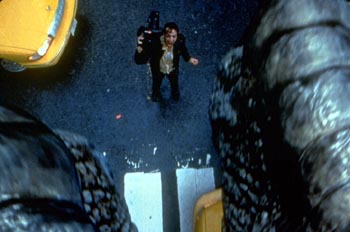Summer Squash
Here, Lizard, Lizard: One 'Animal' (a crazed camerman played by Hank Azaria) summons another in the newest Godzilla.
Computerized 'Godzilla' mashes Manhattan
HE'S MORE of a Frankenstein than a colossus, made from a dozen different films dug up, cut up, sewn together and blasted with electricity. A fine sepia-toned title sequence for Godzilla gives us the monster's backstory: atom-bomb radiation mutates a South Seas lizard--and then Matthew Broderick's character, Dr. Niko Tatopoulos, is introduced studying the earthworms at Chernobyl. It's a promising scene that director Roland Emmerich (Independence Day) treats with a taste of the moral imbecility to come, having Tatopoulos humming "Singin' in the Rain" as he drives past the burnt ruins.
The U.S. government has picked Tatopoulos to investigate bizarre occurrences of chewed-up fishing trawlers and huge footprints. Pleasant chap that Tatopoulos is, he's given Poindexter dialogue: "I believe this is a mutated aberration." His old "college sweetie," Audrey (Maria Pitillo), who dropped him like a hot rock to be a reporter in New York, encounters her ex-flame when he tracks the beast to Manhattan, and she decides to use him as a source for a scoop. Accused of leaking information, Tatopoulos is fired from the government team, resulting in second-act conflict between the couple. Emmerich wants us to think that Audrey is unethical for doing her job, although why--or how--details of Godzilla's attack on Manhattan should be considered top secret is another matter entirely. Is it all a metaphor for the paranoid secrecy under which this film was made?
The grubby news media are also represented by two of the voices on The Simpsons: Hank Azaria as a braggart news cameraman named "Animal" and Harry Shearer, squandered as a Kent Brockman-style news reader. New York's Mayor Ebert (as in Roger) is accompanied by a bald assistant who looks like Gene Siskel; their scenes contain plenty of stupid jokes about "thumbs up and thumbs down." The moral of the new Godzilla is "reporters just get in the way of the military." (Filmmakers working on this level of expense always have delusions of being generals.) But wasn't it the military that raised up Godzilla in the first place? Emmerich and writer/producer Dean Devlin demur, blaming French atom tests, to keep Americans from being hostile about reminders of our own nuke testing in the South Pacific.
The last Godzilla movie that had a theatrical release in the U.S. was Godzilla 1985. The rampage was less memorable than one moving shot: the tight close-up of the rheumy eyes of Raymond Burr, introduced as a never-to-be-whole-again victim of the King of Monsters. A scant 10 minutes of the current version are amusing, especially the finale, which finds Godzilla tangled in a New York landmark. But the four writers credited couldn't think of a story that would go along with a monster attack on Manhattan. It's a grand subject--why doesn't it get a grand treatment? Technique alone can't suspend disbelief, only imagination can; without imagination, even the best computer animation of a giant lizard running through three-dimensional models of New York City looks as fake as a guy in a rubber suit crunching paper-and-stick models.
[ San Jose | Metroactive Central | Archives ]
![]()

Myles Aronowitz
Godzilla (PG-13; 138 min.), directed by Roland Emmerich, written by Dean Devlin, Ted Elliott, Terry Rossio and Emmerich, photographed by Ueli Steiger and starring Matthew Broderick and Maria Pitillo.
From the May 28-June 3, 1998 issue of Metro.
![[Metroactive Movies]](/movies/gifs/movies468.gif)